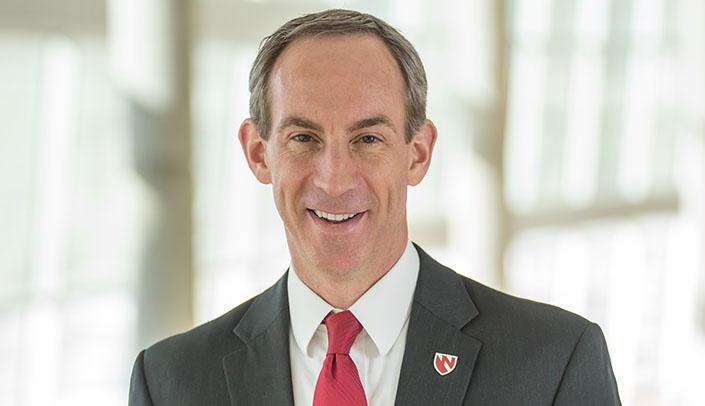When the College of Medicine made the decision in March to suspend all medical student participation in patient care activities, followed by UNMC’s decision to suspend on-campus classes, the faculty and students were faced with a challenge — and they rose above it together.
Under the aegis of Sean Figy, M.D., assistant professor of surgery, and Regan Taylor, M.D., assistant professor of internal medicine, college faculty created the “Impact of Infectious Diseases” (IID) course, a timely topic that helped students continue to work toward their degrees as the campus, and the world, grappled with COVID-19.
Kelly Caverzagie, M.D., associate dean for educational strategy, praised Drs. Figy and Taylor.
“They were able to stand up this course, get it approved through the curriculum committee and get it scheduled in less than a week,” he said.
But he wasn’t surprised.
“Our faculty are experienced educators,” he said.
The students, Dr. Caverzagie said, adapted to the online curriculum well — again, not a surprise.
“It’s not ideal for them not to be in a clinical learning environment, but as expected, they’ve been very gracious, accommodating and patient with how fluid the changes have been.”
Hannah Tandon, class of 2022, was impressed with the speed of the faculty’s response.
“We were fortunate that our faculty had the foresight to design a new online curriculum for us to complete while waiting to resume our clerkships in July,” she said. “I have personally enjoyed the ‘Impact of Infectious Diseases’ curriculum. The content has helped me better understand our current pandemic and the complexity of managing an infectious disease crisis, and our small group discussions have been thoughtful and engaging.”
Vanessa Woodard, class of 2021, also called the transition to online curriculum relatively smooth, though she acknowledged challenges.
“I think the M3s, soon to be M4s, are particularly having a difficult time with the transition to online learning, as we are working to prepare our residency applications and will need clinical experience and letters of recommendation prior to September,” she said. “However, we realize the importance of preventing the spread as much as possible, and I am glad that the school was quickly able to come up with a means of keeping us engaged in medical school outside of the clinic.”
Jake Son’s class of 2023 were in the renal block of pre-clinical education when UNMC began implementing protective measures against COVID-19 on campus.
“Though the strengths of UNMC’s program, including group learning and interpersonal connections, could easily have been lost in translation, faculty members worked closely with student leaders such as our class president to preserve a sense of unity and closeness,” he said.
Now in the neuroscience block, he admits he’s seen limitations to online learning, “particularly with respect to learning neuroanatomy without being in the lab and relying on pre-recorded lectures from the previous academic year,” he said. “But despite these added layers of complexity, the flexibility of studying from home has opened up new opportunities for my classmates to contribute to the community.”
Son, Tandon and Woodard all said they appreciated the community service aspect of the course, which allots time for community outreach efforts.
“Organizations such as Musicians for Healing, which performs for senior living facilities, have encouraged us to understand that as medical students we are responsible for helping others beyond the walls of the clinic,” Son said.
“A number of students have organized service projects including food drives for food pantries, music outreach to assisted living facilities, support for refugee communities, sewing masks for Nebraska Medicine and beyond, providing child and pet care for health care workers, and collecting and distributing PPE donations,” Tandon said. “The flexibility of the coursework has allowed me to really dive into community service in a way I would not be able to in a traditional medical school didactic course or during my clinical clerkships.”
Dr. Caverzagie said he has been proud to see how the medical students have embraced the community outreach portion of the curriculum.
“I couldn’t be more happy,” he said. “These are exceptional students and very engaged. The university has written many stories about the things being done, but for every story being written, there are 10 more stories of student outreach behind the scenes.
“Every one of our students is actively engaged in the community through this project, and that makes me extremely proud to know that the students are giving back to society while learning at the same time.”
Moving forward, Dr. Caverzagie said, the faculty’s quick response and the students’ work in the IID course will help the college as it continues to adapt to the “new normal.”
“We’re learning as we go, we’re making changes based upon student feedback,” he said. “We’re going to continue to learn for the next four weeks and then think about how we can take the lessons learned from this and apply that to the future.
“We’ve learned we need to be adaptable, because it’s unpredictable. We also know that communication is needed, ensuring that students and faculty know that we have their back.”
Dr. Caverzagie said he’s looking forward to having students back in clinical environments, which is tentatively set for approximately July 1. But the lessons of this spring have been useful.
“For the third years, Justin Mott, M.D., has created a leadership curriculum, and we’re excited about that,” he said. “Post-COVID, life will be different, and we need physicians to step up and be leaders, as they have always done.”
